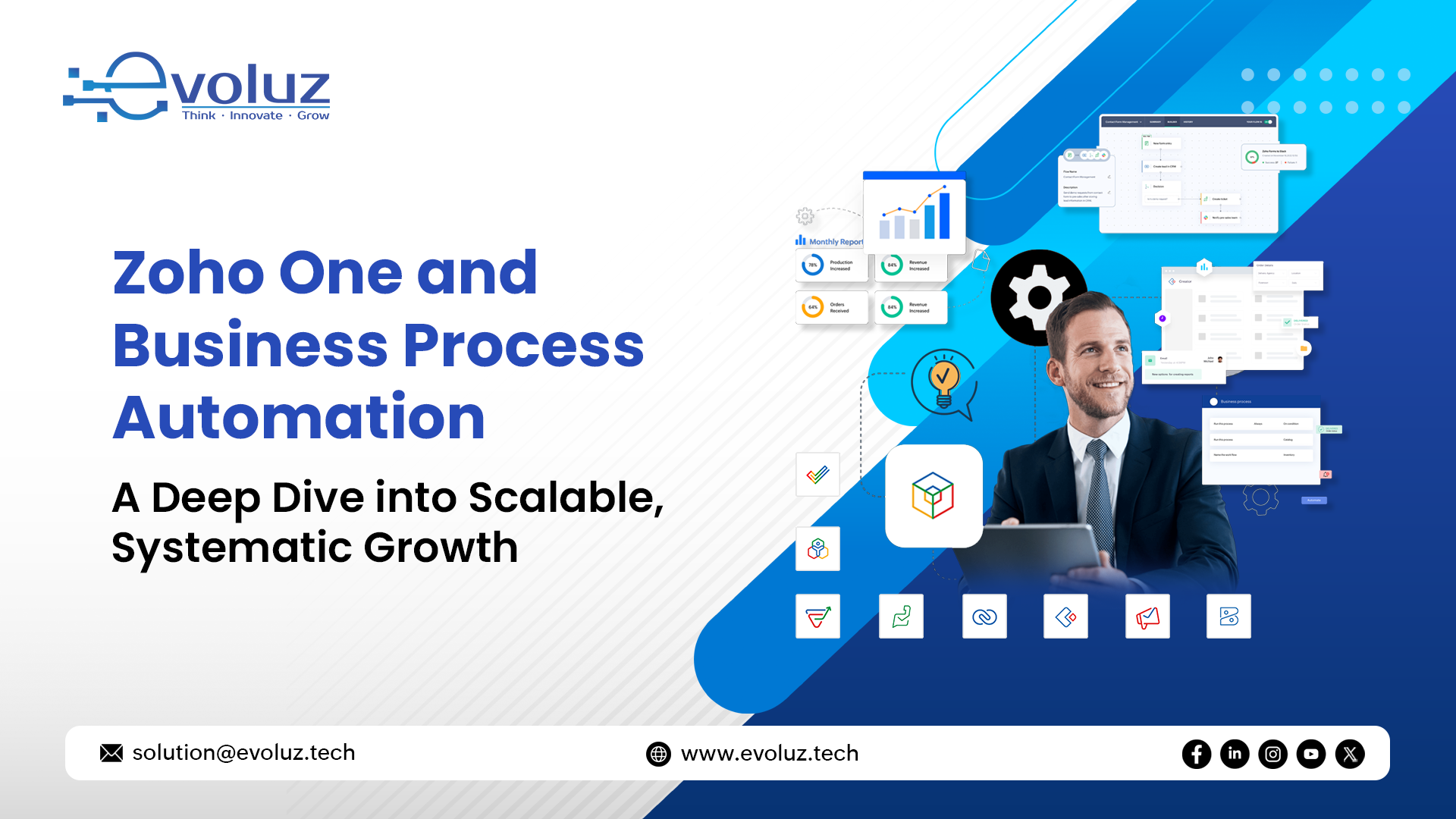Zoho One and Business Process Automation
For organizations aiming to grow sustainably, operational efficiency isn’t a bonus—it’s a necessity. Manual processes and disjointed systems create friction, slow down teams, and limit visibility across business functions.
The solution lies in business process automation—a strategy that eliminates redundant effort and turns structured workflows into scalable assets.
This isn’t just about saving time. It’s about building a process-driven foundation that supports growth, compliance, and consistency.
And in that context, Zoho One stands out—not as a software bundle, but as a cohesive ecosystem for managing and automating core business functions end-to-end.

Understanding Business Process Automation Beyond the Buzzword
Business process automation (BPA) refers to the use of rule-based logic and technology to execute structured workflows with minimal manual intervention.
While often oversimplified to task automation, its real value lies in eliminating operational gaps between departments—sales, finance, HR, operations, and support.
Key outcomes of effective Business Process Automation include:
Reduction in turnaround time for routine approvals
Improved data integrity and version control
Elimination of redundant handoffs and communication gaps
Consistent enforcement of compliance and SOPs
Real-time updates across connected systems
The success of automation depends less on the tools used and more on the clarity of workflows, the quality of cross-functional collaboration, and the ability to iterate processes based on outcomes—not assumptions.

The Role of Zoho One in System-Wide Process Automation
Zoho One is often marketed as a suite of 45+ applications under one license—but what matters more is the underlying architecture.
Unlike traditional software stacks that require custom middleware, Zoho One enables native interconnectivity between apps like Zoho CRM, Books, People, Desk, and Projects.
From an operational perspective, this means:
Triggers can span apps: A CRM action can initiate an invoice in Zoho Books, or a ticket in Zoho Desk.
User roles and permissions remain consistent across systems.
Audit logs, process ownership, and workflow history are centralized and traceable.
No external scripting is required for 80% of common automations.
This tight integration makes process automation within Zoho One not just possible, but practical—especially for small and mid-sized businesses without full-time technical teams.

Structuring Business Process Automation with Process-First Thinking
Before implementing any automation, organizations must map existing processes clearly.
Tools like Zoho Blueprint (inside CRM), Workflow Rules (across Desk, Books, People), and Zoho Flow (for cross-app automation) all rely on defined triggers, conditions, and outcomes.
A structured approach involves:
Identifying high-frequency, low-complexity tasks
Breaking down manual steps and identifying decision points
Documenting dependencies and exception scenarios
Defining clear ownership and escalation rules
Testing and iterating the automation logic based on actual usage
This process-first lens ensures that automation aligns with how your business actually operates—not just how software teams assume it should.

Department-Level Implementation: Use Cases Across the Business
Sales: CRM Workflow Automation
Automated lead routing by geography, industry, or deal size
Follow-up sequences triggered by inactivity or custom field updates
Quote generation linked to product configurations and discount rules
Finance: Books and Invoice Automation
Triggered invoice creation from closed deals
Recurring billing for subscription-based services
Tax calculations and late fee workflows aligned to compliance zones
HR: People and Onboarding Workflows
Auto-triggered onboarding tasks across teams (HR, IT, Admin)
Leave and attendance workflows tied to shift, role, and policies
Appraisal cycles initiated with reminders and self-assessment triggers
Support: Desk Automation Framework
Ticket triaging based on category, source, and SLA conditions
Escalation paths for aging tickets with no agent response
Post-resolution survey workflows for continuous improvement
These are not theoretical examples—they’re default capabilities within Zoho One, implementable without third-party integrations.

Data Flow, Reporting, and Continuous Optimization
One often overlooked benefit of business automation is the ability to extract clean, consistent data for strategic decision-making.
Disconnected workflows lead to fragmented reporting and flawed insights.
By automating with Zoho One:
CRM, finance, and support data is always in sync
Workflow performance (approvals, escalations, time-to-close) is measurable
Bottlenecks become visible through tools like Zoho Analytics
This allows leadership to move from anecdotal feedback to process-level diagnostics—enabling ongoing refinement of automation rules and SLAs.

Scalability, Control, and Risk Mitigation
Process automation at scale introduces new governance challenges: who controls workflows, who can edit them, and how changes are tracked.
Zoho One provides role-based access, approval workflows, version logs, and audit trails across apps to mitigate these risks.
This is especially critical for businesses in regulated industries (finance, healthcare, legal) where compliance cannot be an afterthought.
Final Considerations: The Strategic Lens of Automation
Business process automation should never be reduced to convenience. In mature organizations, it functions as a lever for:
Operational scalability without linear headcount growth
Standardization of service delivery across clients and teams
Data accuracy that supports forecasting and compliance
Agile iteration based on real-world process performance
Zoho One, when applied with clarity and ownership, becomes more than a software stack—it becomes the framework for running a process-driven business.

FAQs
Business Process Automation (BPA) is the use of software to automate repetitive tasks, streamline workflows, and improve efficiency across departments like sales, HR, finance, and operations.
The 4 main types are:
Operational processes – core functions like sales or manufacturing
Supporting processes – HR, IT, or finance
Management processes – strategy and planning
- Automation processes – workflows driven by software or systems
RPA (Robotic Process Automation) automates specific tasks using bots, while BPA (Business Process Automation) focuses on end-to-end workflow automation across systems and departments.
Zoho One is an all-in-one business suite with 45+ integrated apps for CRM, finance, HR, marketing, project management, and automation—all in one subscription.
Zoho offers individual apps you can subscribe to separately. Zoho One bundles most Zoho apps into one platform with unified billing, integration, and admin control.




